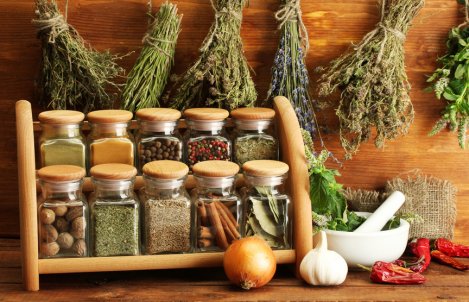Cooks around the world have used the seeds, roots, barks and leaves of plants to add deliciously subtle or bold flavor to their cuisine for centuries. These little gems add zip to dishes, but did you know they can add pep to your step, too The health benefits of herbs and spices are numerous; they add antioxidants to our diet and are a versatile and flavorful alternative to salt.
From Aleppo pepper to zafatar, theres a bounty of herbs and spices from which to choose. Heres six of our favorites, along with their healthful properties:
-
Hot and piquant, cayenne pepper has a high concentration of capsaicin, a substance that not only gives the pepper its bery sensation, but temporarily acts as a pain reliever, too. Who knew! Add small amounts to sauces, stews and seafood dishes for enhanced flavor and heat.
- Cumin, wonderfully warm and fragrant, promotes healthy digestion. Add it to curry dishes and chili, or stir into Greek yogurt for an instant dip.
- Dill is considered an antibacterial herb, and also protects against free radicals that can cause cellular damage. Enjoy a refreshing dip by mixing together Greek yogurt, chopped dill and cucumber its not only tasty, it may keep the wrinkles away, too.
- If youre tummy is upset, try ginger. Its known to help with nausea, sea sickness and upset stomach. Make your own ginger tea by pouring boiling water over several thin slices of ginger root, add juice from ½ lemon and let steep for five minutes.
- More than a garnish, parsley is a good source of folic acid, an important B vitamin for heart health. Fresh is best when it comes to this slightly peppery herb which can add balance and brightness to most dishes. Pair it with salads, pasta and grains, as well as fish and meats.
- Have you been a little forgetful lately Be sure to add rosemary to your grocery list. It contains carnosic acid that helps fight of free radical damage in the brain. When roasting potatoes that have been lightly dressed with olive oil, place sprigs of rosemary around the pan; they’ll not only boost the flavor of your spuds, they may just help you remember where you left your keys.
Now that you know the hidden benefits of some of our favorite herbs and spices, lets start using them. Get the most out of our herbs and spices by purchasing them in smaller quantities to ensure you’re using them at their peak flavor. We also recommend you store them in tightly sealed jars, and away from heat and light. When cooking with your herbs and spices, try toasting or blooming them first its an easy way to bring out even more of their fragrance and flavor. If youre hungry for more, our 12 Great Ways to Use Healthy Herbs and Spices has got you covered.
Still hungry We show you how you can eat your way to better health in our new ONE Food as Medicine Toolkit. Better yet, try our African Heritage Spicy Chickpea recipe, which I fondly call the magic bean recipe. A couple of simple vegetables melded with a few teaspoons of spices and some chickpeas, and abracadabra, you have a heart-warming, fragrant, and filling dish in around 20 minutes. Now thats magical.
Happy and healthy eating!
Deborah Plunkett, Program Manager, Oldways Nutrition Exchange (ONE)






